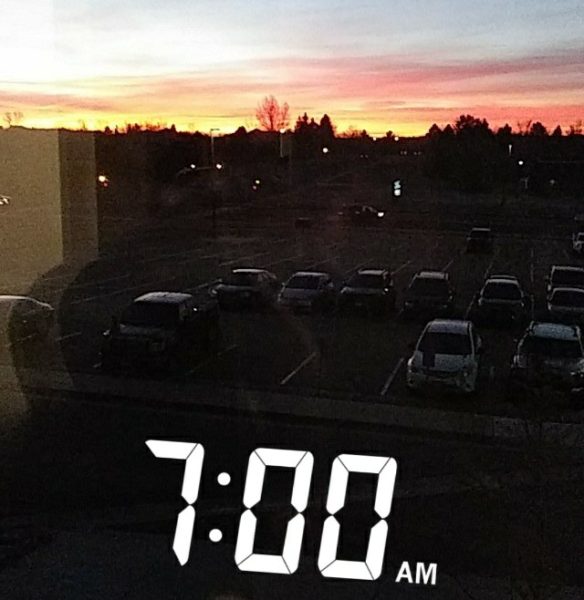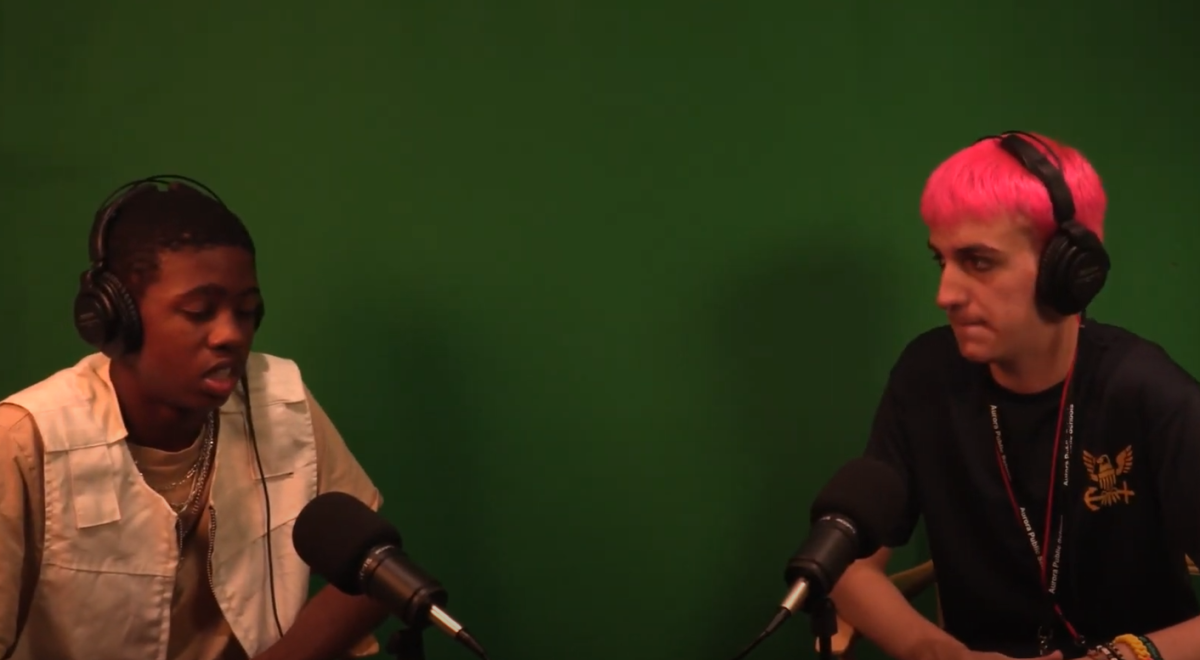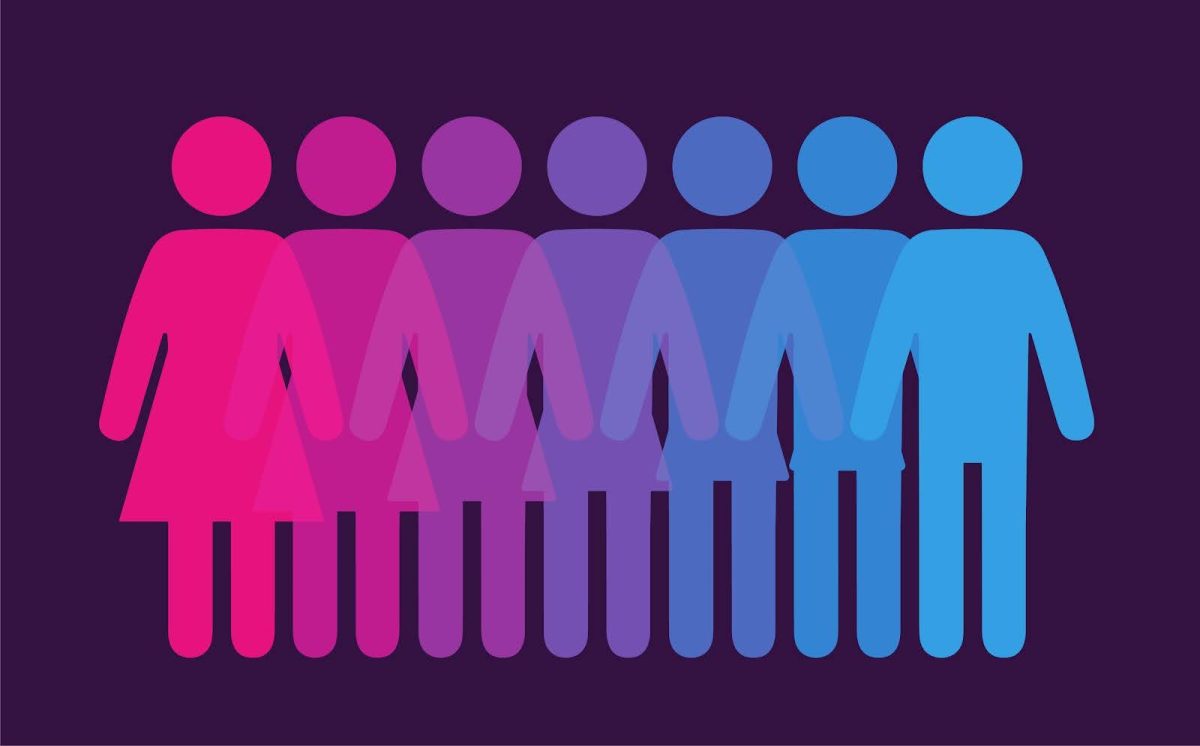Feature Photo By: Alexis Drummond – Photo of the sunrise, looking out of one of the windows at Rangeview. Most students arrive between 7:00 and 7:20.
After being in the Aurora Public School (APS) system for over ten years, I have concluded that we have one of the longest school days in any Colorado school district.
Although there may be a school in Colorado that does have a longer school day than APS, there is a slim chance they have the same start time and end time as most schools the APS district.

APS high schools — Rangeview in particular — has a start time of 7:30 and an end time of 3:21. This is almost an eight hour school day giving students seven class periods a day, each 58 minutes long and a lunch of 30 minutes.
Out of Colorado’s 181 school districts, the vast majority of high schools start after 7:30 and get out either at or before 3:00.
Why hasn’t our district pushed back our start time? Our superintendent — Rico Munn — should follow the Cherry Creek and Greeley-Evans school districts and push back their school start times.
In March of 2017, the Cherry Creek School District pushed back their 7:10 start time for high school, to 8:20. Results from the start time changing show that students are more engaged after the extra hour of sleep they were able to get.
“I get to sleep in later and wake up an hour later,” Michaela Cope, junior at Cherokee Trail High School. “My mental health [has increased] because I’m not so stressed about homework, sleep, and not having to worry about other activities after school.”
Not only will it save thousands of dollars, but teens will also get more of a chance to get the recommended eight to ten hours of sleep a night.
Today, students are staying up late either on their phones or doing homework. This means that students at Rangeview only get three to eight hours of sleep on an average school night.
I am one of these students who only gets a few hours of sleep a night.
Having grown up in a generation where we rely on our phones and computers, I have noticed that teens my age are staying up later. This is leading to a decrease in school productivity and an increased rate of mental illnesses.
It is found that teenagers– between the ages of 13-17–spend on average nine hours a day on their phones. 54% of teenagers say they spend too much time on their phones and 41% say that most of the time they spend on their phones, it is on social media — social media has been found to increase depression rates in teens and young adults.
Being a high schooler in the APS system is hard. Most mornings, I arrive at school before the sun rises, and I leave after it sets. I don’t get to see the sun for more than two hours.
After school gets out at 3:21, I go to the sport or club I participate in — swimming, golf, and/or Link. After practice or the club is over, I go home and do the pile of homework I have due the next day. By the time I actually get to sit down and relax, it is usually 11 or 12 at night. This gives me about five to six hours of sleep on a good day.

“I have a hard time waking up in the morning so I really wish I could sleep in just a bit more,” said sophomore Marissa Chambers. “11:30 is a normal time that I go to bed and I get up at 6:00.”
Now I know it may seem like I get enough sleep, but is that really the case? I have friends that get fewer hours of sleep than I do. Could lack of sleep be the cause of the increase of mental health in teens? Could the late nights from social media or homework be the cause?
“The problem with lack of sleep and work overload is that you get to do the things that make you happy less, it does make me feel more down, and I don’t have energy to do anything,” said Chambers.
This is why Munn should push back school start times to attempt to get teens a little bit more sleep at night.
If I could get a half hour to an hour more of school, I will be a little bit more energized and prepared to do the work I have in my classes.
If Munn pushed back start times an hour, students would start school at 8:30 and would be released at 4:21. The conflict with being released at 4:21, sports games would have to be later and practice for sports would be later.

According to Corey Christiansen, Public Information Officer of Aurora Public Schools, we won’t see a school start time change for the 2019-2020 school year.

“We frequently review school calendars and scheduling as part of our regular continuous improvement efforts. When it comes to school start times, there are many factors to consider such as transportation routes, transportation costs, childcare concerns, and parent feedback,” said Christiansen. “There are no current plans to move back school start times. We continue to review research on the potential benefits and drawbacks of changing start times.”
To fix this problem, APS could go on a block schedule or just make each class period shorter.
As much as I hate the idea of a block schedule, we may just need to follow in Cherokee Trial’s lead and have a block schedule.
On Thursday, February seventh, APS was on an hour delay due to weather conditions. This made each class period about nine minutes shorter. I got a little bit more sleep and was more productive in my class than I was on a normal day.
“My corrupted soul repaired itself that day,” said T’arria Champliss, junior. “I just felt a spiritual like enhancement.”
If Munn and school board members — Marques Ivey, Kyla Armstrong-Romero, Cathy Wildman, Dan Jorgensen, Debra E. Gerkin, Monica Colbert, and Kevin Cox— were to just make the start time 8:30 instead of 7:30, it could fix the problem we are seeing.
This extra hour of sleep will help students be more productive; they will get more work done in class, more energized, and more importantly, mental illnesses amongst teens will decrease.






